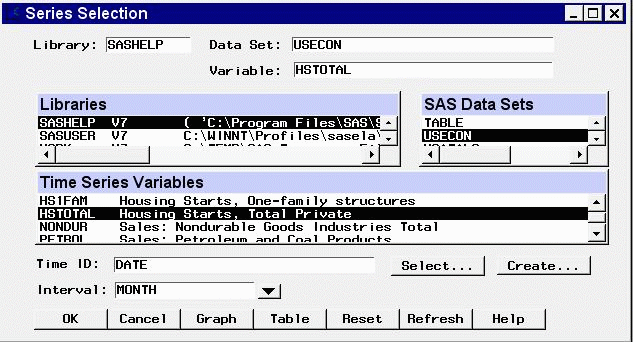| Window Reference |
Series Selection Window
Use this resizable window to select a time series variable by specifying a library, a SAS data set or view, and a variable. These selections can be made by typing, by selecting from lists, or by a combination of the two. In addition, you can control the time ID variable and time interval, and you can browse the data set or view plots of the series from this window.

This window appears automatically when you select the View Series Graphically or Develop Models buttons in the Time Series Forecasting window and no series has been selected, and when you open the Time Series Viewer as a standalone tool. It is also invoked by using the Browse button in the Develop Models window.
The system requires that series names be unique for each frequency (interval) within the forecasting project. If you select a series from the current input data set that already exists in the project with the same interval but a different input data set name, the system warns you and gives you the option to cancel the selection, to refit all models associated with the series by using the data from the current input data set, to delete the models for the series, or to inherit the existing models.
Controls and Fields
- Library
is a SAS libname assigned within the current SAS session. If you know the libname associated with the data set of interest, you can type it in this field and press Return. If it is a valid choice, it will appear in the libraries list and will be highlighted. The SAS Data Sets list will be populated with data sets associated with that libname.- Data Set
is the name of a SAS data set (data file or data view) that resides under the selected libname. If you know the name, you can type it in and press Return. If it is a valid choice, it will appear in the SAS Data Sets list and will be highlighted, and the Time Series Variables list will be populated with the numeric variables in the data set.- Variable
is the name of a numeric variable contained in the selected data set. You can type the variable name in this field or you can select the variable with the mouse from the Time Series Variables list.- Time ID
is the name of the ID variable for the input data set. To specify the ID variable, you can type the ID variable name in this field or click the Select button.- Select button
opens the Time ID Variable Specification window to let you select an existing variable in the data set as the Time ID.- Create button
opens a menu of methods for creating a time ID variable for the input data set. Use this feature if the data set does not already contain a valid time ID variable.- Interval
is the time interval between observations (data frequency) in the selected data set. If the interval is not automatically filled in by the system, you can type in an interval name or select one from the pop-up list. For more information about intervals, see Chapter 4, Date Intervals, Formats, and Functions, in this book.- OK
This button is present when you have selected "Develop Models" from the Time Series Forecasting window. It closes the Series Selection window and makes the selected series the current series.- Close
If you have selected the View Series Graphically icon from the Time Series Forecasting window, this button returns you to that window. If you have selected a series, it remains selected as the current series.If you are using the Time Series Viewer as a standalone application, this button closes the application.
- Cancel
This button is present when you have selected "Develop Models" from the Time Series Forecasting window. It closes the Series Selection window without applying any selections made.- Reset
resets the fields to their initial values at entry to the window.- Table
opens a Viewtable window for browsing the selected data set. This can assist you in locating the variable containing data you are looking for.- Graph
opens the Time Series Viewer window to display the selected time series variable. You can switch to a different series in the Series Selection window without closing the Time Series Viewer window. Position the windows so they are both visible, or use the Next Viewer toolbar icon or F12 function key to switch between windows.- Refresh
updates all fields and lists on the window. If you assign a new libname without exiting the Series Selection window, use the refresh action to update the Libraries list so that it will include the newly assigned libname. Also use the Refresh action to update the variables list if the input data set is changed.
Selection Lists
- Libraries
displays a list of currently assigned libnames. You can select a libname by clicking it, which is equivalent to typing its name in the Library field. If you cannot locate the library or directory you are interested in, go to the SAS Explorer window, select "New" from the File menu, then select "Library" and "OK." This opens the New Library dialog window. You also assign a libname by submitting a libname statement from the Editor window. Select the Refresh button to make the new libname available in the libraries list.- SAS Data Sets
displays a list of the SAS data sets (data files or data views) located under the selected libname. You can select one of these by clicking it, which is equivalent to typing its name in the Data Set field.- Time Series Variables
displays a list of numeric variables contained within the selected data set. You can select one of these by clicking it, which is equivalent to typing its name in the Variable field. You can double-click a series to select it and exit the window.
Copyright © SAS Institute, Inc. All Rights Reserved.